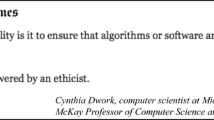Abstract
We argue that future database systems must provide autonomy for individuals for the privacy of data they manage. We propose a design for such a system, identify challenges and problems, and suggest some approaches to these. We enunciate the reasons for informational self-determination systems, which include legal, organizational and technical issues. Our main goal is to achieve a widely-accepted realistic and practical solution in order to ensure privacy for individuals in our future world, yet without hindering business and security.
Similar content being viewed by others
References
M.S. Ackerman, L.F. Cranor, et al. Privacy in E-Commerce: Examining User Scenarios and Privacy Preferences. In S. Feldman and M. Wellman, editors, Proceedings of the 1st ACM Conference on Electronic Commerce, pp. 1–8. ACM Press, Denver CO, 1999.
R. Agrawal, J. Kiernan, et al. Hippocratic Databases. In Proceedings of VLDB 2002, pp. 143–154. Morgan Kaufmann, Hong Kong, China, 2002.
ALLEA, the European Federation of National Academies of Arts and Sciences. Privacy Protection in the Information Society, All European Academies, Amsterdam (ALLEA) 2002.
BBC News. Public Oppose ID Card Scheme, 2003. Available from: http://news.bbc.co.uk/2/hi/technology/3004376. stm, last visit: September 2004
Burkert H. (1997) Privacy-Enhancing Technologies: Typology, Critique, Vision. In: Agre P.E., Rotenberg M. (eds) Technology and Privacy – The New Landscape. MIT Press, Cambridge MA, pp. 125–142
Etzioni A. (1999) The Limits of Privacy. Basic Books, New York
Gellman R. (1998) Does Privacy Work? In: Agre P.E., Rotenberg M. (eds) Technology and Privacy. MIT Press, Cambridge MA, pp. 193–218
K. Gormley. One Hundred Years of Privacy. Wisconsin Law Review, 1335–1441, 1992.
Joshi J.B.D., Ghafoor A. et al (2002) Security and Privacy Challenges of Digital Government. In: McIver W.J., Elmagarmid A.K. (eds) Advances in Digital Government: Technology, Human Factors, and Policy. Kluwer, Boston and Dordrecht, pp. 121–136
Lessig L. (1999) Code and Other Laws of Cyberspace. Basic Books, New York
Maghiros I., Centeno C. et al (2003) Security and Privacy for the Citizen in the Post-September 11 Digital Age: A Prospective. IPTS Publications, Overview, Sevilla
OECD, Organisation for Economic Cooperation and Development. Guidelines on the Protection of Privacy and Transborder Flows of Personal Data, 1980. Available from: http://www.oecd.org/document/18/0,2340, en26493425518151861111,00.html, last visit: 12.09. 2004
Privacy and the National Information Structure. Principles for Providing and Using Personal Information, 1995. Available from: http://www.cdt.org/privacy/comments_iitf.html, last visit: September 2004
Registratiekamer. Privacy-Enhancing Technologies: The Path to Anonymity, 1995. Revised edition available from: http://www.cbpweb.nl/documenten/av11Privacy-enhancingtechnologies.htm
Rosenberg R.S. (1992) The Social Impact of Computers. Academic Press, San Diego
R.J. Schweizer and H. Burkert. Verwaltungsinformationsrecht. In H. Koller, G. Miller, R. Rhinow and U. Zimmerli, editors, Schweizerisches Bundesverwaltungsrecht, t. 5, Informations- und Kommunikationsrecht, pp. 1–45, ed. by R.H. Weber, Helbing & Lichtenhahn, Basel, 1996.
The European Parliament and the Council of the European Union. EC95 Directive 95/46/EC “On the Protection of Individuals with Regard to the Processing of Personal Data and on the Free Movement of Such Data”, Brussels, 1995.
S.D. Warren and L.D. Brandeis. The Right to Privacy. Harvard Law Review, 4(5): 193–220, 1890.
Westin A.F. (1967) Privacy and Freedom. Atheneum, New York
Author information
Authors and Affiliations
Corresponding author
Rights and permissions
About this article
Cite this article
Hodel-Widmer, T.B. Designing databases that enhance people’s privacy without hindering organizations. Ethics Inf Technol 8, 3–15 (2006). https://doi.org/10.1007/s10676-006-9105-3
Published:
Issue Date:
DOI: https://doi.org/10.1007/s10676-006-9105-3




